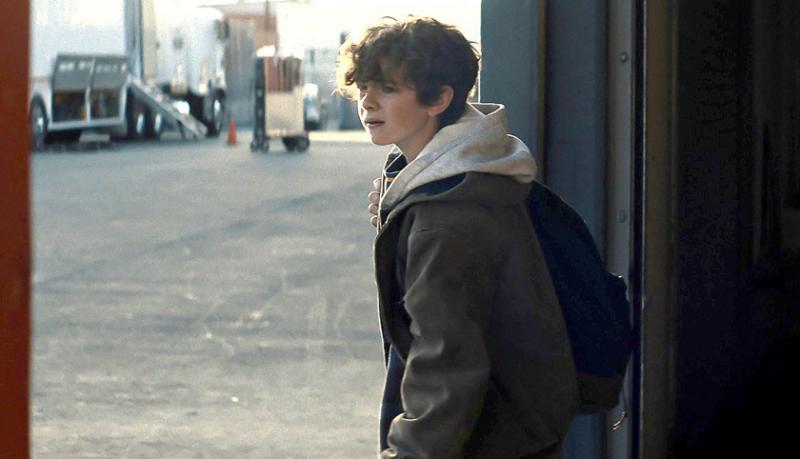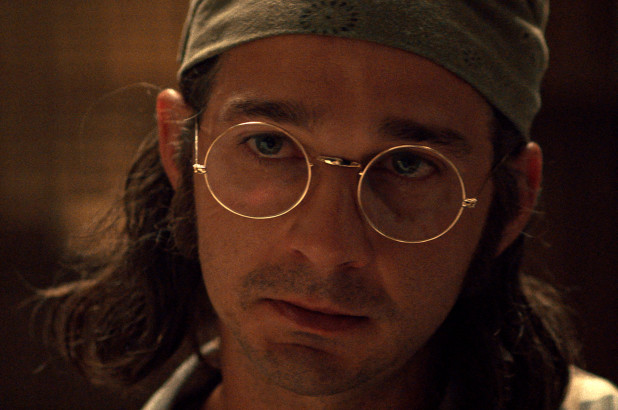Honey Boy review - coming to terms with dad | reviews, news & interviews
Honey Boy review - coming to terms with dad
Honey Boy review - coming to terms with dad
Shia LaBeouf draws on childhood in bold family portrait

Blue periods can lead to golden streaks. Such is almost the case with Honey Boy, which Shia LaBeouf wrote during a court-ordered stay in a rehab clinic for the treatment of PTSD symptoms.
Director Alma Har’el turns LaBeouf’s script into an aesthetic vision of L.A. neorealism with a dab of the surreal. The main ingredients in the broth are dialogue, confinement, and emotions. Most of the film comprises interior scenes involving high-tension games, feuds, or rehearsals between young Otis and his Dad inside the motel room they live in. The script picks apart the web of influences that go into what makes a dad bad: hardship, family breakup, and a love that turns violently desperate. We also learn a lot about what it’s like to be the son in this situation.
James is a recovering alcoholic who relies on his son’s acting career for income. His commitment to his son bloats into authoritarian control in the form of push-up routines, competitive juggling matches and strict rehearsal schedules. Out of pride and exasperation, James demands a level of devotion that Otis simply cannot manage or fully understand. The stewpot of Father-Son relations spits and gurgles into often stretched stand-offs. There is one scene in which Otis’ mother phones the motel room, and Otis is forced to act as mediator between the hysterical squabbling of his parents. He assumes the role of intermediary and, as in the rest of his childhood life, substitute-Adult.
 This is LaBeouf’s best acting performance in what has evolved into an intriguingly jagged career. In his movie and real life roles he has often assumed positions of either explosive rage or befuddling weirdness. Eager to “move on”, we imagine, LaBeouf does not discard these impulses but integrates them into a more complex character that is at different moments deplorable, laughable and pitiable. Clearly, much introspective work has been done not just into personal history but into acting too. The great payoff is that unlike many previous roles, LaBeouf does not always demand centre stage, but opens up to and emboldens his main partner: the powerful Noah Jupe as Otis.
This is LaBeouf’s best acting performance in what has evolved into an intriguingly jagged career. In his movie and real life roles he has often assumed positions of either explosive rage or befuddling weirdness. Eager to “move on”, we imagine, LaBeouf does not discard these impulses but integrates them into a more complex character that is at different moments deplorable, laughable and pitiable. Clearly, much introspective work has been done not just into personal history but into acting too. The great payoff is that unlike many previous roles, LaBeouf does not always demand centre stage, but opens up to and emboldens his main partner: the powerful Noah Jupe as Otis.
Honey Boy is at times compelling but also often lethargic, with some scenes drifting or seeming to fill empty space. We see too little of Otis outside the motel room, constantly under the puppet-strings of his impulsive father. Yet the restraint, for the most part, does help. The past falls apart unless it is intensified. With a dash of humility and maturity, LaBeouf manages to work it through.
rating
Explore topics
Share this article
The future of Arts Journalism
You can stop theartsdesk.com closing!
We urgently need financing to survive. Our fundraising drive has thus far raised £49,000 but we need to reach £100,000 or we will be forced to close. Please contribute here: https://gofund.me/c3f6033d
And if you can forward this information to anyone who might assist, we’d be grateful.

Subscribe to theartsdesk.com
Thank you for continuing to read our work on theartsdesk.com. For unlimited access to every article in its entirety, including our archive of more than 15,000 pieces, we're asking for £5 per month or £40 per year. We feel it's a very good deal, and hope you do too.
To take a subscription now simply click here.
And if you're looking for that extra gift for a friend or family member, why not treat them to a theartsdesk.com gift subscription?
more Film
 A House of Dynamite review - the final countdown
Kathryn Bigelow's cautionary tale sets the nuclear clock ticking again
A House of Dynamite review - the final countdown
Kathryn Bigelow's cautionary tale sets the nuclear clock ticking again
 theartsdesk Q&A: Idris Elba on playing a US President faced with a missile crisis in 'A House of Dynamite'
The star talks about Presidential decision-making when millions of lives are imperilled
theartsdesk Q&A: Idris Elba on playing a US President faced with a missile crisis in 'A House of Dynamite'
The star talks about Presidential decision-making when millions of lives are imperilled
 Urchin review - superb homeless drama
Frank Dillane gives a star-making turn in Harris Dickinson’s impressive directorial debut
Urchin review - superb homeless drama
Frank Dillane gives a star-making turn in Harris Dickinson’s impressive directorial debut
 Mr Blake at Your Service review - John Malkovich in unlikely role as an English butler
Weird comedy directed by novelist Gilles Legardinier
Mr Blake at Your Service review - John Malkovich in unlikely role as an English butler
Weird comedy directed by novelist Gilles Legardinier
 Don't Let's Go to the Dogs Tonight review - vivid adaptation of a memoir about a Rhodesian childhood
Embeth Davidtz delivers an impressive directing debut and an exceptional child star
Don't Let's Go to the Dogs Tonight review - vivid adaptation of a memoir about a Rhodesian childhood
Embeth Davidtz delivers an impressive directing debut and an exceptional child star
 One Battle After Another review - Paul Thomas Anderson satirises America's culture wars
Leonardo DiCaprio, Teyana Taylor, and Sean Penn star in a rollercoasting political thriller
One Battle After Another review - Paul Thomas Anderson satirises America's culture wars
Leonardo DiCaprio, Teyana Taylor, and Sean Penn star in a rollercoasting political thriller
 Steve review - educator in crisis
Cillian Murphy excels as a troubled headmaster working with delinquent boys
Steve review - educator in crisis
Cillian Murphy excels as a troubled headmaster working with delinquent boys
 Can I get a Witness? review - time to die before you get old
Ann Marie Fleming directs Sandra Oh in dystopian fantasy that fails to ignite
Can I get a Witness? review - time to die before you get old
Ann Marie Fleming directs Sandra Oh in dystopian fantasy that fails to ignite
 Happyend review - the kids are never alright
In this futuristic blackboard jungle everything is a bit too manicured
Happyend review - the kids are never alright
In this futuristic blackboard jungle everything is a bit too manicured
 Robert Redford (1936-2025)
The star was more admired within the screen trade than by the critics
Robert Redford (1936-2025)
The star was more admired within the screen trade than by the critics

Add comment